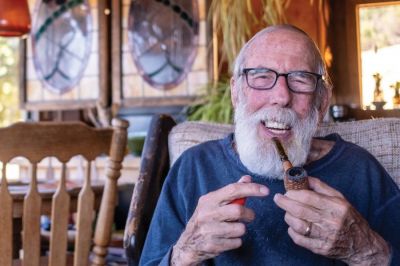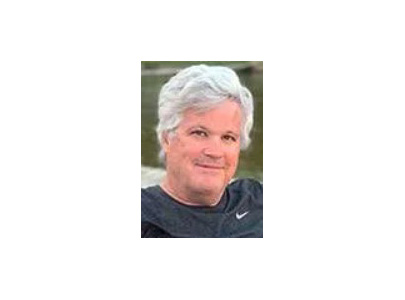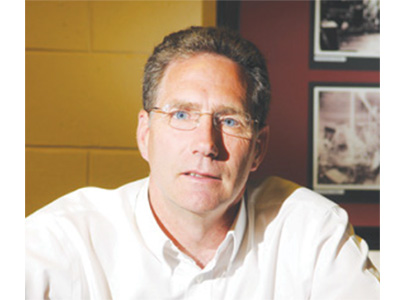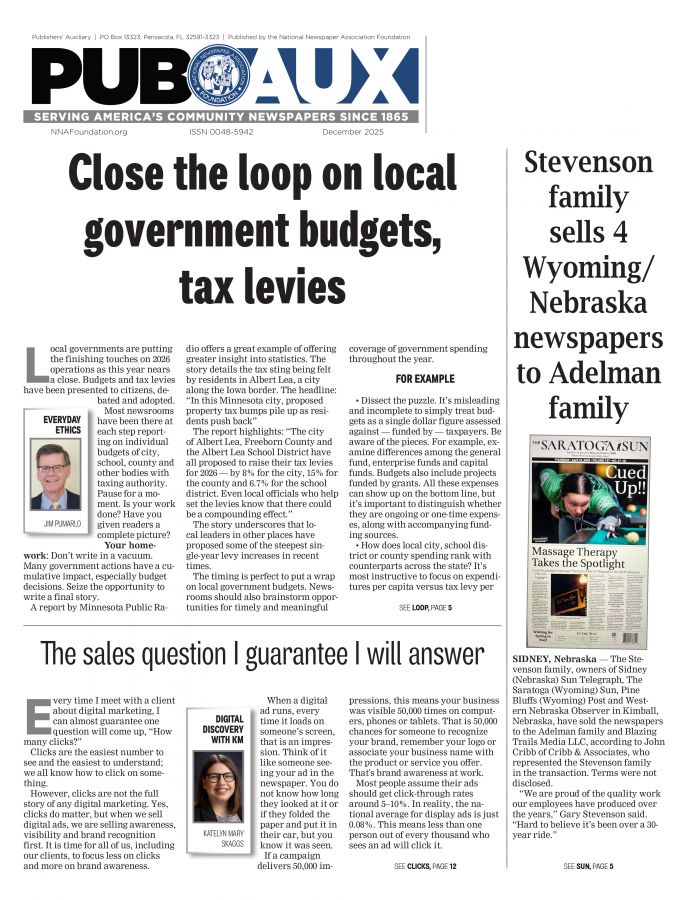Pulitzer-winning editor, Dave Mitchell, dies at 79
Jan 1, 2024

BEN STOCKING
Point Reyes Light
Dave Mitchell, a hard-nosed newsman with a soft heart who won journalism’s highest honor for dogged reporting on a cult in his rural weekly’s backyard, died in his Point Reyes Station (California) home on Oct. 26 of complications from Parkinson’s disease. He was one month shy of his 80th birthday.
Mitchell, the publisher and editor of the Point Reyes Light for 27 years, won the Pulitzer Prize for Meritorious Public Service in 1979 for his fearless reporting on Synanon, a once-respected drug treatment organization that morphed into a violent, pseudo-religious cult. It was only the fourth time a weekly paper had taken the prize since the Pulitzers were established in 1917.
At 6 foot, 3 inches tall, Mitchell filled a room with his gangly frame and big personality. He loved recounting journalism war stories while puffing on his corn-cob pipe, a camera slung around his neck. Did you hear the one about the cow that got stuck in a tree?
With enthusiasm and unflagging drive, Mitchell worked his staff hard, challenging them to match his zeal for the job.
“Working for Dave was a lot all at once,” said Don Schinske, who served as the Light’s business manager for a decade and co-owned the paper for several years. “He was relentless in every sense of the word. He was attached to that paper like it was his identical twin. Dave was the Light, and the Light was Dave.”
After the Pulitzer Prize was announced, national media outlets descended on the newsroom to interview Mitchell and his then-wife Cathy, who shared the honor with her husband and Richard Ofshe, a University of California, Berkeley, sociology professor who served as an unpaid consultant on the Synanon coverage. The trio became the protagonists of a quintessential David-and-Goliath story, which was later turned into a made-for-television movie, “Attack on Fear.”
The Mitchells forged ahead with their reporting even though the Marshall-based cult — located just a few miles up Highway 1 — had stockpiled $60,000 worth of guns, beaten a local rancher and placed a rattlesnake in the mailbox of a lawyer who sued them. Synanon’s phalanx of lawyers had also slapped multi-million-dollar libel lawsuits on larger media outlets, including Time magazine, the San Francisco Examiner and the Bay Area’s ABC news station.
“Everyone else was afraid to touch the story,” said Carl Nolte, a columnist for the San Francisco Chronicle who considers Mitchell a hero. “Dave and Cathy were doing this thing that nobody else would do. It was brave.”
Mitchell’s lifelong friend Philip Neujahr, whom he met in college, heard the Pulitzer news while watching Walter Cronkite on CBS. He was startled to see his friend on America’s most popular nightly newscast, but he wasn’t surprised that Mitchell had aggressively reported a dangerous story.
“He was not afraid of anything,” Neujahr said. “He had a strong sense of justice and a strong sense that sleaze needed to have a light shone on it.”
The Mitchells bought the paper for $47,000 in 1975. They stuck a fold-out couch in the office — now home of Coastal Marin Real Estate — and lived there for a time. The office included an old-fashioned linotype machine that caused chronic production headaches.
The Mitchells soon removed the hefty monster and switched to offset printing, resulting in a cleaner-looking product. They had to tear off the front of the building to extract the old hot-type press, which ended up in the bushes behind C Street.
Under Mitchell’s leadership, the Light covered everything from coastal management to giant zucchinis to cars plunging off West Marin’s treacherous roads. On the same front page that announced the Pulitzer victory was a story about a proposed nude beach, a topic to which Mitchell gave extensive coverage over the years.
A devotee of nudist beaches himself, Mitchell was once sunbathing near Red Rock when, to the astonishment of onlookers, a suicidal woman drove her car off a 350-foot cliff. Ever the journalist, Mitchell pulled up his pants and went to work, grabbing his camera and snapping a photo of a rescue helicopter carrying her to the hospital.
The Light’s coverage was steadfastly local. Mitchell once said the paper would only cover a tsunami in San Rafael if someone from West Marin had been shopping there and drowned.
NEW OWNERS, NEW STYLE
Although offset printing gave the paper a more modern look, some folks missed its old-time feel when they held it in their hands, said Dewey Livingston, a former production manager at the Light and a historian of West Marin.
The Light’s readership consisted of old-time ranchers, longtime summer residents from the East Bay and San Francisco, and a new cohort of back-to-the-land progressives and artists who settled in West Marin during the late 1960s and ’70s after the Summer of Love.
Mitchell placed less emphasis on art and culture than previous editors, who published lengthy poems submitted by readers and covered every play and art exhibit in town.
“Dave removed some of the hippie artistry of the old Light and made it a little straighter,” Livingston said. “There was a lot more news.”
Among those disappointed by the changes was Elizabeth Whitney, who had been on the news staff for about a year before the Mitchells came to town. She had assumed Mitchell would keep her on, given her extensive knowledge of the community. He did not.
“The minute he took over, a whole bunch of things changed instantly,” Whitney said. “No more poetry. No more tide tables. No more birthdays column.”
Whitney was particularly irked by Mitchell’s penchant for covering car crashes. She soon started her own paper, the Tomales Bay Times.
A CULT COMES TO TOWN
As the Synanon story unfolded, some readers complained that Mitchell spilled too much ink on the cult, whose members had begun shaving their heads and wearing overalls like their leader, Charles Dederich, a former Alcoholics Anonymous member who founded Synanon in Santa Monica.
Synanon began as a drug rehab program. By the time it took up residence at what is now the Marconi Conference Center State Historic Park, it had a reputation as a sort of new-age encounter group. But its central therapeutic exercise, known as “The Game,” was anything but touchy-feely. Participants were encouraged to verbally abuse one another and make accusations that didn’t have to be true.
In addition to news accounts about Synanon’s misdeeds, the paper published a series of editorials urging local and state officials to investigate the cult, which continued to claim tax-exempt status, even as it amassed millions of dollars in profit.
Synanon had a self-styled militia that attacked anyone who tried to leave. Dederich encouraged deep suspicion of the world outside, demanded that his followers have abortions and vasectomies and pressured married couples to switch partners.
Synanon’s most infamous victim was Paul Morantz, who won a $300,000 judgment against the cult on behalf of a kidnapping victim. In October 1978, two militia members removed the rattles from a rattlesnake and placed it in Morantz’s mailbox. When he reached inside, the serpent sank its fangs into his hand. His doctors said the bite nearly killed him.
Mitchell broke a story documenting how Dederich had known about the attack ahead of time. He had beaten the L.A. Times to a story in its own backyard.
Synanon sued the Mitchells for libel, but Dederich was ultimately ordered to pay the couple $100,000. They ran pictures of the two $50,000 checks on the front page. The ruling was a win for investigative journalists in California, granting them the right to keep secret the names of confidential sources in certain libel cases.
In 1980, Dederich pleaded no contest to charges of conspiracy to commit murder in connection with the rattlesnake incident. Several years later, Synanon disbanded.
BAY AREA BEGINNINGS
David Vokes Mitchell was born on Nov. 23, 1943, in San Francisco. His father, Herbert Mitchell, was the vice president and minority partner of a printing company. His mother, Edith Alfred Vokes, an immigrant from Canada, sold advertising for the Christian Science Monitor.
Mitchell had no siblings. When he was 3, the family moved across the bay to Berkeley, where he spent his childhood and attended Berkeley High School before transferring to a private school in St. Louis.
He earned a bachelor’s degree in English from Stanford University in 1965 and went on to earn a master’s in communications there in 1967, the same year he married Cathy Casto, a classmate.
He taught briefly at high schools in New York and Florida, where he joined a drive to register Black voters. He went on to teach literature and journalism at Upper Iowa University in Fayette, where he served as an advisor to the student newspaper and the Black student union.
In 1970, Mitchell landed his first reporting job at a small daily in Council Bluffs, Iowa. He covered city hall for six months before moving back to California to take a reporting job at the Union Democrat in Sonora. In 1973, he became editor of the Sebastopol Times, a weekly where Cathy was the features editor.
BECOMING THE BOSS
Two years later, the Mitchells sold their house and purchased the Light. The paper had 1,700 readers and a loyal readership but was on the verge of bankruptcy.
“Naïve and idealistic, Cathy and I had bought the paper convinced we could make it the New York Times of West Marin,” they wrote in “The Light on Synanon,” a book they co-authored with Ofshe in 1980.
To Neujahr, it made sense that his friend, who was 31 when he bought the paper, would take such a leap of faith.
“It takes a pair of balls to buy a small rural newspaper and think you can run it,” Neujahr said. “But he could run the show and not have to take orders from anybody else.”
In his work and in his personal life, Mitchell was quick to act on impulse, Neujahr said.
“He was passionate about whatever he was passionate for, which was quite a few things,” he said. “His life would have been calmer if he’d been a more calculating person, but then he wouldn’t have been Dave. He was exuberant and quick to love.”
Mitchell was married five times and divorced four. Most of those marriages were short, until he met his last wife, Lynn Axelrod, who was with him for 13 years, the last five as his spouse. They remained together until he died in his sleep at his cottage perched on a hillside on the east side of Tomales Bay.
A DIFFICULT FAREWELL
The stress of running the newspaper and chasing the Synanon story took a toll on his marriage to Cathy, which ended in divorce. They decided to sell the paper, and promised readers they would find a buyer with more business experience.
“We are giving up a newspaper we have loved to the point of obsession,” they wrote in a farewell editorial.
With a Pulitzer on his resume, it didn’t take long for Mitchell to land a job at the San Francisco Examiner. His editors sent him to cover insurrections in El Salvador and Guatemala, where he was once caught in a firefight between guerillas and government forces.
But the drama of foreign reporting proved less alluring than the rewards of local reporting, where every story had a more palpable impact.
Two years after he left, Mitchell reacquired the paper after the owner he sold it to defaulted on her loans. His second tenure at the Light would last 22 years, and when it was over, by Mitchell’s count, the paper had won 109 state and national newspaper awards.
His ambitions remained grand despite the paper’s limited finances and remote location. Mitchell became deeply interested in the county’s history and its people, whose makeup was changed by an influx of Latino immigration during the 1970s and ’80s.
Many of the newcomers came from Jalostotitlán, a town in central Mexico where cattle farming was a central part of the economy. The immigrants arrived with the know-how to work on West Marin’s ranches.
In a highly unusual move for a small newspaper, Mitchell sent a reporter to Jalostotitlán to tell the newcomers’ story. He paid for the trip out of his own modest salary.
He later assigned stories about all the major immigrant groups that had arrived in West Marin since the 1800s. He wanted his readers to see their Latino neighbors’ stories as a reflection of their own.
“He had a very clear vision, and a very astute one,” said Janine Warner, who reported from Jalostotitlán. “If people had an understanding of the history of immigration to Point Reyes, they would be more understanding of the latest arrivals.”
Dave hired an 11-year-old girl, Alicia Hernandez, to write a bilingual column called “Que Pasa.” The column was edited by Victor Reyes, a Spanish teacher and interpreter who did man-on-the street interviews with Latino residents that were published in both languages.
“It created some connections between the Latinos and the gringos,” Reyes said.
When Warner and Reyes left the Light to start a Spanish-language newspaper for Marin County, Mitchell let them produce it at the Light during weekends.
SMALL PAPER, BIG AMBITIONS
Mitchell followed up the Mexico coverage by sending cub reporter Dave Rolland to Switzerland, Croatia, Ireland and the Azores. In each case, he traced the family tree of West Marin residents and connected with relatives in their homelands.
“Dave loved doing big things,” Rolland said. “For me, it was an incredible opportunity.”
During his visit to Croatia, which was in the midst of a civil war, Rolland was arrested and held at gunpoint for taking photos in a prohibited area.
“That’s a war story I’ll tell for the rest of my life,” he said. “I owe this to Dave, his trust in me and his bold, damn-the-torpedoes approach to work and life.”
Working for Mitchell could also be challenging.
“Dave was a man loaded with eccentricities, some endearing, others maddening. He was both volatile and nurturing,” Rolland said. “When his better angels were in charge, he treated his staff like family.”
Mitchell had strong opinions about everything, from what stories to cover to how to craft a lede and crop a photograph. Schinske, the production manager, sometimes had to act as a buffer between the hard-charging editor and his team.
“I was a Dave whisperer,” Schinske said. “Dave wasn’t the only one who had opinions, and a newsroom can only be so turbulent and still get out a paper.”
Former staffers, most of whom arrived fresh out of college, described him as a devoted mentor. Victoria Schlesinger, who worked at the Light as an intern in 2003, said Mitchell stressed the importance of keeping things simple. “He taught me that readers will understand anything if you give it to them a teaspoon at a time,” she said.
Salaries at the Light were lousy and the benefits few, if any. But Mitchell compensated for this however he could, loaning staffers his car and taking them out for dinner and drinks.
Hours at the paper were long, and production nights, which typically stretched past midnight, were often capped off with beer and pizza. By this time, the paper had moved to the Creamery Building. The business and production staff worked downstairs. and the editorial staff worked upstairs, where Mitchell posted a sign above his desk succinctly capturing his philosophy: “It’s a newspaper’s duty to print the news and raise hell.”
Mitchell relished the production of the paper as much as he enjoyed pursuing stories. Each week, he gave articles to a typesetter, who would load them into a machine that spit out galleys — waxed columns of newsprint that staffers painstakingly cut into paragraphs with X-Acto knives and laid onto grids the size of a newspaper page.
They drove the pages to a Petaluma print shop early on Thursday mornings and delivered the paper to post offices and shops around West Marin in the afternoon.
They laid out pages and wrote headlines without the assistance of a computer program. Mitchell took pride in one quintessentially West Marin headline that had to be squeezed into a single column: “Carpool to yoga potluck.”
“He was excited and giggling, as if he had deciphered the Rosetta stone,” Schinske said. “He took sheer delight in doing the work he did.”
Mitchell lived out the journalist’s creed: Comfort the afflicted and afflict the comfortable.
“If anyone we wrote about had bad luck, if they’d suffered a tragedy or a disaster, without saying a word to anyone, Dave would walk over to Wells Fargo and open a bank account for them,” said Cat Cowles, a former typesetter. “And then he’d tell readers how to donate at the end of the story. He was GoFundMe before there was GoFundMe.”
Mitchell’s second reign at the paper ended in 2005, when he sold the Light for $500,000 to a Los Angeles attorney, Robert Plotkin, a choice of buyers he would later regret. Plotkin had high ambitions for the paper but seemed more interested in national recognition than the nuts and bolts of local news coverage. The two men clashed over Plotkin’s management of the Light and became involved in a legal dispute that they eventually settled out of court.
LIFE AFTER THE LIGHT
After selling the paper, Mitchell wrote a blog for 17 years that carried on his newspaper column, Sparsely Sage and Timely. It included musings on everything from the winners of the 4-H rabbit show to grumpy observations about Donald Trump. It also featured an account of his relationship with Billy Hobbs, a homeless man he and Lynn befriended in town. They let him stay in their house for a few cold winter months and later helped him find subsidized housing.
“Dave cared about social justice and protecting the little guy,” Axelrod Mitchell said. “He wasn’t religious, like his parents. His religion was helping people.”
At the end of his life, Mitchell was stricken with Parkinson’s, which ravaged his memory and compromised his speech and balance. Unable to leave the house, he spent much of his time in a comfy easy chair he inherited from his father, enjoying the procession of wildlife outside his picture window.
The house is adorned with articles and prizes he won over the years, including a lifetime achievement award from the International Society of Weekly News Editors. “He called that his second Pulitzer,” Axelrod said.
The day before Mitchell died, Tom Riley, his former advertising director, stopped by. They reminisced for an hour and took a selfie. It never occurred to Riley that he would be the last friend to visit.
“You’ve had a good run,” Riley told him.
“Yeah,” Mitchell replied.
Mitchell’s beloved easy chair is empty now, but his legacy lives on.
Donations in Mitchell’s memory can be made to Planned Feralhood (P.O. Box 502, Point Reyes Station, CA 94956), the Southern Poverty Law Center or a charity of your choice. A memorial will be scheduled in the new year.










